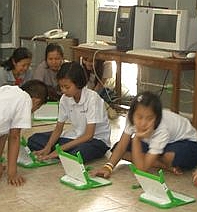I am Roland, from Switzerland, and I think that the officials of India, China and of other countries turning down OLPC started a discussion on the appropriateness of OLPC XO laptops and other technologies for children's education. What concerns me is that the opinions of subsequent discussions were on both sides rather superficial. Even though I am not an expert on education in developing countries, I would like to take up this discussion again hoping for better informed and more differentiating opinions on the Children's Machine XO.
I think it is necessary to distinguish different groups of countries with different situations of their education systems:
- countries where the majority of kids have no access to schools because there are by far not enough of them.
- countries where some (urban?) regions have almost sufficient number of schools (maybe with bad quality of education due to lack of teachers or lack of school material) and some other (rural?) regions have absolutely insufficient number of schools resulting in almost no education.
- countries with sufficient number of schools almost everywhere but insufficient quality of education due to lack of teachers or school material.
- countries with sufficient quality of general education everywhere but lacking computer education.
Then I set up the following Theory:
"In order to achieve a satisfactory, general and IT education by using OLPC infrastructure kids need not only XO's but also schools (buildings with rooms, servers, electricity etc) and tutoring by trained teachers. "(The role of the teachers may change considerably but they will still be necessary to give direction, motivation and support.) While giving XO's to kids without schools and teachers is still much better than nothing, it will not allow to achieve a sufficient education that way because most kids left alone miss support, direction and dedication.
Field reports tell how smart kids were by putting computers to use without any tutoring. Although these kids astonishingly learned to find things in the internet without knowing English this will not allow them to gain a well rounded basic education on their own. If the above theory is true the following conclusions can be made:
- countries in groups C) and D) can directly increase the quality of their education using the OLPC infrastructure. They have the least additional costs on top of it since they do not need to build more schools. These countries are also the most likely to be able to afford the purchase of OLPC infrastructure.
- countries in group A) first need to build schools and employ teachers before they can make use of OLPC infrastructure. This group could so far not afford to build just those schools and therefore will be even less able to purchase OLPC equipment in addition to schools.
- countries in group B) have still limited education budgets that do not allow to solve all education problems at once. So they have to choose the best option to spend their money on: 3a) they purchase OLPC equipment for the existing schools at the cost of not building more schools in undeveloped (rural) areas. This increases the quality of education in urban areas but not the number of educated kids in rural areas. 3b) they build schools in undeveloped areas at the cost of not having OLPC in either area. This does not increase the quality of education but the number of educated kids.
Now it comes also as no surprise that mainly emerging market countries [group C) and D)] are among the first to sign MOU's with OLPC. And it also explains the high interest of 1st world countries (group D) that could improve mainly their IT education at lowest possible cost compared to the purchase of commercial IT hardware.
In case of India and China their interest to finally develop and build their own school laptops rather than being dependent on foreign technology might be a further reason for their refusal of One Laptop Per Child.




This is a very useful analysis. However, I would like to present a different argument for group B.
Suppose that, instead of building and staffing new schools in areas that lack them, the government gave every child an olpc laptop that included self-tutoring software for reading, writing and mathematics? Or to save even more money, suppose they gave one laptop per family, and the children shared (and indeed anyone who has seen children use computers knows they often do it in pairs, one at the keyboard and the other standing behind)? And in this scheme parents would also have the opportunity to learn.
If olpc costs $500 per laptop for 5 years and each family has on average 5 children, that would be only $20 per child per year, which is far more bang-per-buck than opening new schools. Such a plan would mean cash-strapped countries could bring literacy to much more of the population.
Of course, this would not be nearly as good as schools for everyone, but it would still be a huge educational gain. Furthermore, it could be just the first stage, with regular schools being consructed later. Furthermore, oplc could supplement the schools. Imagine how much money would be saved if school started with third grade, the children already having picked up most of the knowledge on their own from the laptops.
I know this is a really different way of doing things, but look at the revolutions that have come about from personal computers and from the internet. Might not the new technology in olpc produce some similarly revolutionary changes in elementary education?
Roland,
I think this country classification is absolutely necessary. There are at least three or four different groups of developing nations, and it seems fair to argue that the poorest ones (perhaps Haiti in the Americas and many African nations)are simply not ready to (or able to) afford OLPC. This is shocking to say, but unfortunately, it's the real scenario.
The problem with countries B, C and D is that inside them, you find a bit of a mix of all these categories. Why? The most pervasive poverty lives close to extremely rich people.
Inequality (of opportunities, of income distribution and so forth) is the key characteristic of many developing nations, for example in Latin America. So, for example, Chile is considered a successful economy in the region, yet it is also one of the most unequal societies of the continent. Even Negroponte has said that Chile is too well-off to be a priority for OLPC, but as we always make clear in our campaign (ucpn.cl) we DO HAVE ALMOST 1/3 OF ALL THE CHILDREN living in poverty: 1 million students out of a total of 3,5 million currently enrolled.
So, my point is, yes, you classification is very useful, but we still need to be careful with over-simplify local realities. Chile is a C country with a lot of B and some D going on at the same time.
LR
Luis,
You make a very good point. Applying it to the United States, I wonder if children in poor neighborhoods, like in the inner city, might do better if they were given olpc laptops? I do know that we are often told the schools in these neighborhoods are pretty bad, and have high drop-out rates. Maybe oplc could help solve this problem.
Totally agree. It is not a mistery that poor neighborhoods in the U.S. are as poor as many of the underprivileged areas of developing nations. This is something really ugly for the wealthiest country in the world, but the truth is, you also have B and C cases in your nation. Poverty does not know nationalities. It is a condition found everywhere. Hence, I seriously believe that an educational plan including the use of OLPC would greatly benefit thousands of poor kids in America.
saludos,
LR
I too think a low-cost computer can be a benefit to American schools, but then again, right or wrong, OLPC will not be in USA Schools: http://www.olpcnews.com/use_cases/education/childrens_machine_xo_usa_school.html
Dear Eduardo, Dear Luis,
thanks for your replies. In most parts I agree with your arguments. I just see two unsolved problems:
What is the quality of self-acquired education?
If whatever type of countries are forced to distribute XO's to poor areas instead of providing schools and teachers then I agree it is much better than nothing. But it would by far not be as good as providing schools and teachers even without XO's. Until I am shown opposite facts I doubt that the majority of children can gain a full and balanced basic education just by self-learning. Because this needs direction and dedication which poor parents, who both need to work, cannot provide either. Of course kids will learn something off XO's by themselves. But every kid will learn something else and it is not sure they will be able to sufficiently read, write and calculate in the end. In short the result will be questionable.
What is the best education for a limited budget?
The above questionable result would still have to be paid for by a lot of money. The very poor countries cannot afford this whatsoever. So OLPC cannot achieve progress there. The countries with mixed types of poverty might be able to afford it but they rightly ask themselves if they could spend that same money to greater effect. E.g. building schools - whatever simple kinds - and employing teachers - even if still much too few - might be a better option than distributing XO's without any further educational infrastructure.
I agree that XO's might improve also 1st-world education a great deal. As soon as 2nd- and 3rd-world countries report success with OLPC 1st-world-governments will find themselves under great political pressure and will also apply some sort of OLPC project.
With best regards, Roland